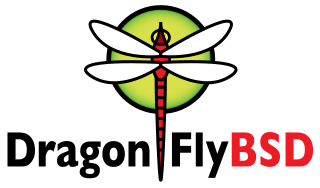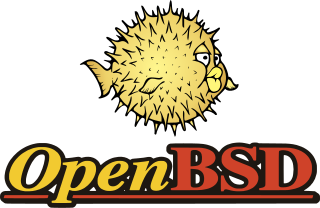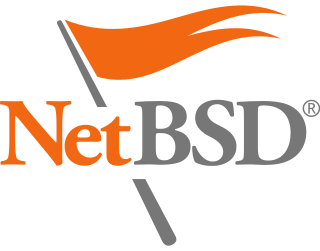
In the context of an operating system, a device driver is a computer program that operates or controls a particular type of device that is attached to a computer or automaton. A driver provides a software interface to hardware devices, enabling operating systems and other computer programs to access hardware functions without needing to know precise details about the hardware being used.

In computing, the Executable and Linkable Format is a common standard file format for executable files, object code, shared libraries, and core dumps. First published in the specification for the application binary interface (ABI) of the Unix operating system version named System V Release 4 (SVR4), and later in the Tool Interface Standard, it was quickly accepted among different vendors of Unix systems. In 1999, it was chosen as the standard binary file format for Unix and Unix-like systems on x86 processors by the 86open project.

Miguel de Icaza is a Mexican-American programmer, best known for starting the GNOME, Mono, and Xamarin projects.

GoboLinux is a Linux distribution whose most prominent feature is a reorganization of the traditional Linux file system. Rather than following the Filesystem Hierarchy Standard like most Unix-like systems, each program in a GoboLinux system has its own subdirectory tree, where all of its files may be found. Thus, a program "Foo" has all of its specific files and libraries in /Programs/Foo, under the corresponding version of this program at hand. For example, the commonly known GCC compiler suite version 8.1.0, would reside under the directory /Programs/GCC/8.1.0.

DragonFly BSD is a free and open-source Unix-like operating system forked from FreeBSD 4.8. Matthew Dillon, an Amiga developer in the late 1980s and early 1990s and FreeBSD developer between 1994 and 2003, began working on DragonFly BSD in June 2003 and announced it on the FreeBSD mailing lists on 16 July 2003.
Netfilter is a framework provided by the Linux kernel that allows various networking-related operations to be implemented in the form of customized handlers. Netfilter offers various functions and operations for packet filtering, network address translation, and port translation, which provide the functionality required for directing packets through a network and prohibiting packets from reaching sensitive locations within a network.
sysfs is a pseudo file system provided by the Linux kernel that exports information about various kernel subsystems, hardware devices, and associated device drivers from the kernel's device model to user space through virtual files. In addition to providing information about various devices and kernel subsystems, exported virtual files are also used for their configuration.
Crypto API is a cryptography framework in the Linux kernel, for various parts of the kernel that deal with cryptography, such as IPsec and dm-crypt. It was introduced in kernel version 2.5.45 and has since expanded to include essentially all popular block ciphers and hash functions.

NDISwrapper is a free software driver wrapper that enables the use of Windows XP network device drivers on Linux operating systems. NDISwrapper works by implementing the Windows kernel and NDIS APIs and dynamically linking Windows network drivers to this implementation. As a result, it only works on systems based on the instruction set architectures supported by Windows, namely IA-32 and x86-64.

PulseAudio is a network-capable sound server program distributed via the freedesktop.org project. It runs mainly on Linux, including Windows Subsystem for Linux on Microsoft Windows and Termux on Android; various BSD distributions such as FreeBSD, OpenBSD, and macOS; as well as Illumos distributions and the Solaris operating system. It serves as a middleware in between applications and hardware and handles raw PCM audio streams.

Greg Kroah-Hartman is a major Linux kernel developer. As of April 2013, he is the Linux kernel maintainer for the -stable branch, the staging subsystem, USB, driver core, debugfs, kref, kobject, and the sysfs kernel subsystems, Userspace I/O, and TTY layer. He also created linux-hotplug, the udev project, and the Linux Driver Project. He worked for Novell in the SUSE Labs division and, as of 1 February 2012, works at the Linux Foundation.

Kernel-based Virtual Machine (KVM) is a free and open-source virtualization module in the Linux kernel that allows the kernel to function as a hypervisor. It was merged into the mainline Linux kernel in version 2.6.20, which was released on February 5, 2007. KVM requires a processor with hardware virtualization extensions, such as Intel VT or AMD-V. KVM has also been ported to other operating systems such as FreeBSD and illumos in the form of loadable kernel modules.

OpenBSD is a security-focused, free and open-source, Unix-like operating system based on the Berkeley Software Distribution (BSD). Theo de Raadt created OpenBSD in 1995 by forking NetBSD 1.0. The OpenBSD project emphasizes portability, standardization, correctness, proactive security, and integrated cryptography.

Alan Cox is a British computer programmer who has been a key figure in the development of Linux. He maintained the 2.2 branch of the Linux kernel and continues to be heavily involved in its development, an association that dates back to 1991. He lives in Swansea, Wales, where he lived with his wife Telsa Gwynne, who died in 2015 and now lives with author Tara Neale, whom he married in 2020. He graduated with a BSc in Computer Science from Swansea University in 1991 and received an MBA from the same university in 2005.

The Linux kernel is a free and open source, UNIX-like kernel that is used in many computer systems worldwide. The kernel was created by Linus Torvalds in 1991 and was soon adopted as the kernel for the GNU operating system (OS) which was created to be a free replacement for Unix. Since the late 1990s, it has been included in many operating system distributions, many of which are called Linux. One such Linux kernel operating system is Android which is used in many mobile and embedded devices.

Illumos is a partly free and open-source Unix operating system. It is based on OpenSolaris, which was based on System V Release 4 (SVR4) and the Berkeley Software Distribution (BSD). Illumos comprises a kernel, device drivers, system libraries, and utility software for system administration. This core is now the base for many different open-sourced Illumos distributions, in a similar way in which the Linux kernel is used in different Linux distributions.

NetBSD is a free and open-source Unix-like operating system based on the Berkeley Software Distribution (BSD). It was the first open-source BSD descendant officially released after 386BSD was forked. It continues to be actively developed and is available for many platforms, including servers, desktops, handheld devices, and embedded systems.
Device Mapper Multipath Input Output often shortened to DM-Multipathing and abbreviated as DM-MPIO provides input-output (I/O) fail-over and load-balancing by using multipath I/O within Linux for block devices. By utilizing device-mapper, the multipathd daemon provides the host-side logic to use multiple paths of a redundant network to provide continuous availability and higher-bandwidth connectivity between the host server and the block-level device. DM-MPIO handles the rerouting of block I/O to an alternate path in the event of a path failure. DM-MPIO can also balance the I/O load across all of the available paths that are typically utilized in Fibre Channel (FC) and iSCSI SAN environments. DM-MPIO is based on the device mapper, which provides the basic framework that maps one block device onto another.
perf is a performance analyzing tool in Linux, available from Linux kernel version 2.6.31 in 2009. Userspace controlling utility, named perf, is accessed from the command line and provides a number of subcommands; it is capable of statistical profiling of the entire system.














